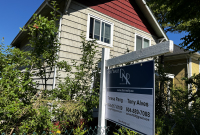Support strong Canadian climate journalism for 2025
George Arcand Jr. says it was a humbling experience to welcome Pope Francis to Canada as the Treaty 6 Grand Chief encouraged the leader of the Roman Catholic Church to join a path of healing by speaking with survivors of residential schools.
“I asked the Pope to walk with us in this new journey," Arcand Jr. said.
Francis arrived Sunday to an honour drum song ahead of a brief welcome ceremony in an airport hangar in Edmonton.
The drum group from Alexis Nakota Sioux Nation sang as the Pope sat between Prime Minister Justin Trudeau and Gov. Gen. Mary Simon. The pontiff was then greeted by several Indigenous, church and political leaders.
Arcand Jr. gave the Pope a traditional beaded medallion as a translator stood behind Francis, who mainly speaks Spanish, and whispered in his ear.
The Pope handed each guest a red box. Most contained a commemorative coin. Some clergy members received rosaries instead.
Francis told reporters earlier on the plane that the six-day visit, which also takes him to Quebec and Nunavut, is a "penitential trip" aimed at reconciliation with Indigenous people for the church's role in residential schools. He said it must be handled with care.
An elevator was used to get the Pope off the plane, and he went for a short ride in a Fiat to the hangar.
There, Francis kissed the hand of residential school survivor Alma Desjarlais of Frog Lake First Nation. Another survivor, Vicki Arcand, said meeting Francis was a "lifetime experience," but she has mixed emotions.
"I think this visit is kind of long overdue," she said. "Maybe it’s something that should have happened many, many years ago. Maybe the start of reconciliation would have started then."
The Pope was then to be escorted to Edmonton's St. Joseph Seminary, where he will be staying while in Alberta.
Francis made the unusual choice not to hold Sunday mass because, organizers said, his first public statements on the trip are to be at the former Ermineskin Indian Residential School in the nearby community of Maskwacis on Monday.
That is where he is expected to apologize to Indigenous Peoples for abuses they have suffered.
An estimated 150,000 Indigenous children were forced to attend residential schools in Canada, where neglect and physical and sexual abuse were rampant. More than 60 per cent of the schools were run by the Catholic Church.
On April 1, after meetings over several days with First Nations, Inuit and Métis groups at the Vatican, Francis apologized for the deplorable conduct of church members involved in residential schools. Indigenous delegates had told the Pope they wanted an apology on Canadian soil.
Assembly of First Nations National Chief RoseAnne Archibald said she told the Pope on Sunday that she is looking forward to his apology, "to walking that healing path forward."
Archibald, whose sister died in a residential school in Ontario, said she's concerned that First Nations leadership was not consulted enough ahead of the Pope's visit. She said the focus of the his time in Canada should be on residential school survivors.
The Ermineskin school was one of the largest of the institutions in Canada. Organizers of the visit have said they expect about 15,000 people will be at Maskwacis to see the 85-year-old pontiff.
Later Monday, Francis is to meet parishioners of an inner-city church in Edmonton. A large outdoor mass at the city's football stadium is scheduled for Tuesday. The Pope then heads to nearby Lac Ste. Anne to take part in an annual pilgrimage.
Francis is to travel Wednesday to Quebec City and deliver a public address following meetings with Trudeau and Simon. The following day another large mass is scheduled in Sainte-Anne-de-Beaupré.
The visit is set to finish Friday in Iqaluit before Francis heads back to the Vatican.
Organizers have said that due to the Pope’s age and physical limitations he will take part in public events for about an hour and will use a wheelchair throughout the tour. Thousands have travelled from different parts of the country to take part in the events.
Mabel Brown, a 77-year-old residential school survivor, journeyed to Edmonton from Inuvik, N. W. T to hear the Pope apologize. She hopes it's an opportunity to move forward in a good way.
“This is a very important time in history,” she said. “Better things are yet to come.”
Indigenous leaders have said they are concerned that the visit will open old wounds. Arcand Jr. called for more mental health supports to be put in place.
"Right now many of our people are skeptical and they’re hurt," he said.
"Bad things were done to our people … I hope that tomorrow when we hear an apology we have the tools and the support necessary to help put people back together again."
The Indian Residential Schools Resolution Health Support Program has a hotline to help residential school survivors and their relatives suffering trauma invoked by the recall of past abuse. The number is 1-866-925-4419.
This report by The Canadian Press was first published July 24, 2022.
— With files from Daniela Germano in Edmonton and Kelly Geraldine Malone in Winnipeg




Comments